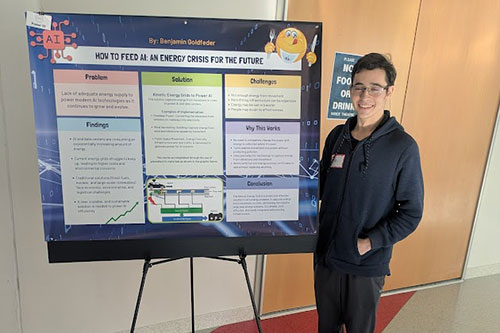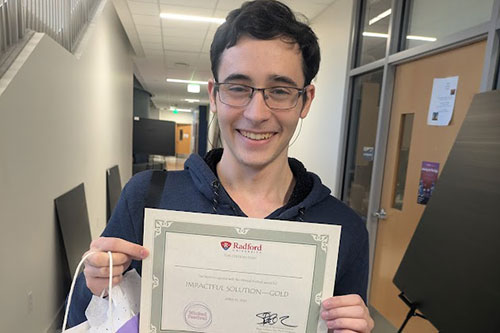
Benjamin Goldfeder was caught off guard when the faculty member teaching his spring semester economics course assigned the class a project for the upcoming Wicked Festival.
“Initially, I was surprised that an economics class would include a project like this, but I quickly came to appreciate the relevance,” the sophomore information science and systems major said.
The Wicked Festival is a biannual event that provides students with an opportunity to delve into some of the world’s most complex and persistent issues, or wicked problems.
The Wicked project process commences at the beginning of each semester. Students pick a topic and work in groups for several weeks to conduct research, which could be anything from finding sources in publications to talking with community leaders. They then typically write papers, give in-class presentations and design a poster to concisely present their work at the festival.
The Wicked Festival began in the fall of 2021 as a collaboration between Radford University’s Department of Political Science and Department of Philosophy and Religious Studies.
The course Goldfeder was enrolled in, Economics 340, introduces students to fundamental concepts, theories and practices related to international economics and business decision-making. It provides students with an overview of the current global economy, business environment, challenges and opportunities.
Jennifer Elias, the ECON 340 instructor, saw the course as a perfect opportunity for students to dive into the wicked problems often involved in doing business.
"The Wicked Festival lets me bring together several key learning goals into one assignment, with the added bonus of a final event that students actually enjoy,” explained Elias, a faculty member in Radford’s Department of Economics.
Elias began assigning the Wicked Festival to her students a couple of years ago with several goals in mind. One was to help students develop essential communication skills.
“They’re not just submitting a paper; they’re presenting their ideas visually and verbally to a broader audience,” Elias explained. “Public speaking might not be central to everyone’s career, but being able to explain your thinking clearly and confidently is universally valuable. And even if practice doesn’t make perfect, it definitely makes it easier.”
Participating in Wicked pushed Goldfeder to “think critically and present solutions to modern-day challenges in a meaningful way,” he said. “These are skills that will serve me well beyond college.”
Elias wanted to use the Wicked Festival, too, as a means to give students more freedom and autonomy than a traditional classroom setting.
“In the past, I’ve used structured debates for this class, but the Wicked format encourages students to explore topics they care about and take ownership of their learning,” she said. “I often find myself learning alongside them.”

Goldfeder’s project focused on energy supply and artificial intelligence. “As the demand for advanced AI technology increases, so does the need for a stable and effective energy supply,” he said, describing the wicked problem project that earned him the festival’s top award in the Impactful Solution category.
He was appreciative that Elias allowed him the “creative freedom,” he said, “to take ownership of my own learning based on my own interests.”
Taking ownership pushes students to fully “grapple with complexity,” Elias noted. “I want them to think not just about what should happen in theory but what’s possible in practice. That means asking tough, practical questions like: Where is that funding coming from? Would the government really pass that law? Why isn’t this happening already? Wouldn’t that harm other stakeholders? Are people unaware – or do they just not care?”
Ultimately, Elias said, the Wicked Festival helps students learn to navigate the real world of trade-offs, uncertainty and compromise.
“If they leave with a better sense of how to approach messy, multidimensional problems,” she said, “I consider that a success.”
Goldfeder agreed.
“Looking back, I absolutely consider this project a huge success,” the Memphis, Tennessee, native said. “It not only enriched my learning in ECON 340 but also gave me experience I can speak to in interviews and future opportunities.”
Elias, Goldfeder said, took several steps to support every student’s success in the class and Wicked project.
“She provided clear guidance at each stage, offered constructive feedback and created a classroom environment that encouraged experimentation,” he explained. “She emphasized that success didn’t mean having a perfect solution, but rather engaging with the complexity of the problem thoughtfully and creatively.”